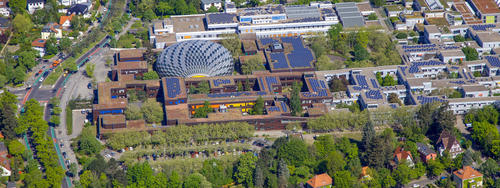The Global Knowledge Value Chain on Sustainability: Addressing Fragmentations through International Academic Partnerships
organized by Dr. Bettina Schorr (FU Berlin / trAndeS)
Live Session on 03.11.2021: 4.00-6.00 p.m. CEST UTC+1
Join via Meeting Link: https://fu-berlin.webex.com/fu-berlin-en/j.php?MTID=m0d9aeb257dcfe7f71d230d8f768c9f31
Universities play a crucial role in the transition towards a sustainable future. In the light of increasing global challenges, like climate change, there is an urgent need to explore the yet untapped potential of academic internationalization for the promotion of sustainability. The incipient literature on the subject argues that internationalization can promote sustainability in different ways: transnational networks provide channels to diffuse relevant knowledge, they facilitate processes of mutual learning, they enhance intercultural sensitiveness and allow the pooling of often scarce resources.
In the workshop, we will contribute to this nascent strand of research by emphasizing a property of international academic networks and transnational academic cooperation still underexplored: their ability to reduce disciplinary and geographical barriers in the global debates on transitions towards sustainability. In particular, by sharing resources and providing access to academic networks, internationalization can help overcome North-South inequalities within education and at the same time bridge the spatially fragmented sustainability research landscape to help define a more comprehensive sustainability strategy required in our globalized world.
The workshop will start with an input on the general subject. Subsequently three researchers of diverse international partnerships will comment on the input. The workshop then opens for a general discussion of experiences in international sustainability-relevant partnerships and explores opportunities for future cooperation.
› REGISTER NOW
Get prepared for the conference
- Sign up and log in using our conference platform Lounjee. Register for the live workshop sessions and receive access to some of the conference materials. (Please open this link with Google Chrome or Safari).
- Watch our short 3-minute tutorial to get familiar with the core functions of our conference platform Lounjee.
- Explore the broad networking opportunities that our conference platform offers by watching this 90 second video.
Workshop Host
 |
Program Director, Postgraduate Program on Sustainable Development and Social Inequalities in the Andean Region (programa trAndeS), Freie Universität Berlin Bettina Schorr holds a PhD in Political Science from the Department of International Relations and Foreign Policy Analysis of the Universität zu Köln, Germany and a magister degree in Political Science from the same university. Her research interests include social inequalities and sustainable development, institutional change and dynamics of contentious politics. Currently, she is a lecturer at the Institute for Latin American Studies at Freie Universität Berlin, Germany, and the program director of trAndeS—Postgraduate Program on Social Inequalities and Sustainable Development in the Andean Region. |
Speakers
|
Deborah Delgado Pugley is a professor of sociology at the Pontifical Catholic University of Peru. She holds a Ph.D. in International Development (Catholic University of Louvain) and Sociology (Paris School of Social Sciences EHESS). Her fields of interest are environmental and climate policies, particularly in the Amazonian regions of Bolivia and Peru, where she has led research teams on climate change, indigenous movements, human rights, natural resource management, forestry development, and gender. She has advised various international institutions and organizations such as FAO, UNDP, and Oxfam. She is currently a visiting professor at KU Leuven and an associate professor at Ghent University. |
|
Brigitta Schütt is a professor of physical geography at Freie Universität Berlin, where she was Vice President until 2018. She received her Ph.D. from RWTH Aachen University and her habilitation from the University of Trier. Her research interests are paleoenvironmental reconstruction, early quaternary paleoclimate, environmental history, soil erosion research, watershed management, and e-learning. Her regional focus is on the Old World dry belt, Central Europe, the Iberian Peninsula, and East Africa. She has received several awards, including the DFG Habilitation Fellowship. Since 2012, she has been a member of the Leopoldina, the National Academy of Sciences, and the Bavarian Academy of Sciences in the Commission for Geomorphology. |
|
Reiner Doluschitz is a professor of Agricultural Informatics and Business Management at the Institute of Agricultural Management at the University of Hohenheim (UH). His research focuses on business management in agriculture and agribusiness, sustainability, cooperativism, leadership concepts for food supply chain management, quality assurance in rural development and regionalization, policy analysis at the individual farm level, technology assessment, e-business, and precision agriculture. He has been head of the Department of Agricultural Informatics and Business Management since 1995, of the Cooperative Research Center since 2007, and of the Food Security Center in Hohenheim since 2017. |
|
Le Minh Thang is a professor of chemistry at Hanoi University of Science and Technology where she holds the chair of the University Council. Her Research directions include selective oxidation of hydrocarbons, hydroformylation on SILP and nano Au catalysts, Catalysts for the treatment of exhaust gases, and photocatalysis for the treatment of wastewater. She is part of the RoHan – Rostock Hanoi DAAD SDG Graduate school “catalysis as key towards sustainable resource management”. Furthermore, she is currently involved in the project “Catalysis – adsorption processes for the treatment of POPs in the exhaust gases from rubber pyrolysis plan” by the Ministry of Science and Technology. |
|
Barbara Fritz holds a joint appointment as professor at the School of Business & Economics and the Institute for Latin American Studies at the Freie Universität Berlin. Her fields of expertise are development economics and international macroeconomics and finance, with a special focus on Latin America. She has published widely on economic development strategies at the intersection of money and finance, on debt and development, financial crises, and workers’ remittances. She intertwines the analysis of monetary and financial processes with a multi-dimensional perspective on inequality, ranging from the national to the regional and global level. While within Latin America, she has a specific focus on Brazil, her extensive work on regional monetary cooperation covers all regions of the developing world. |


